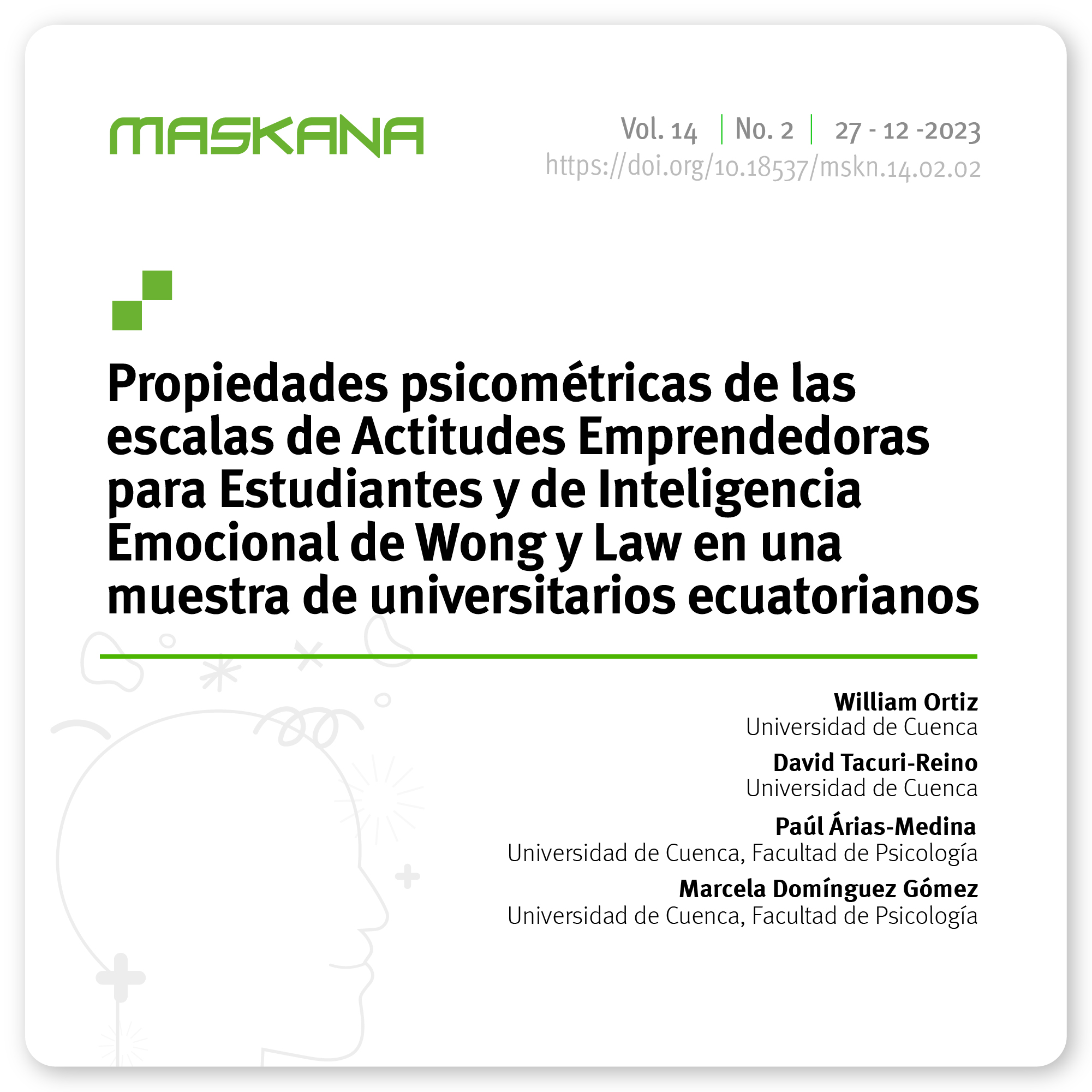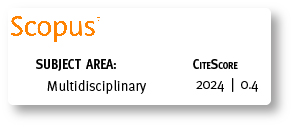Psychometric Properties of the Entrepreneurial Attitudes Scale for Students and the Wong and Law Emotional Intelligence Scale in a sample of Ecuadorian undergraduates.
DOI:
https://doi.org/10.18537/mskn.14.02.02Keywords:
emotional intelligence, entrepreneurship, higher education, attitudes, psychometric properties, educationAbstract
Emotional intelligence directly influences individual´s personal development and could influence entrepreneurship skills as well. The objectives of this study were to assess the construct validity, internal consistency, and metric invariance of the Spanish version of the Wong and Law Emotional Intelligence Scale (WLEIS-S), and the Entrepreneurial Attitudes Scale for Students (EASS) and correlate the levels of emotional intelligence and entrepreneurship in a sample of university students (n=558). The validity, reliability, and invariance analysis reveal adequate goodness of fit, internal consistency and equivalence. In addition, statistically significant correlations were found between all dimensions of the scales. The Entrepreneurship and Emotional Intelligence Scales have adequate psychometric properties. In professional training, emotional intelligence acts as a decision-making ability and entrepreneurial capacity as a factor for future development.
Downloads
Metrics
References
Acosta, J. (2015). Inteligencia Emocional: Desmontando Tópicos. ESIC Editorial.
Acosta-Prado, J. C., y Zárate Torres, R. A. (2019). Validation of the Wong and Law Emotional Intelligence Scale for Chilean managers. Suma Psicológica, 26(2). https://doi.org/10.14349/sumapsi.2019.v26.n2.7
Acosta-Prado, J. C., Zárate-Torres, R. A., y Tafur-Mendoza, A. A. (2022). Psychometric Properties of the Wong and Law Emotional Intelligence Scale in a Colombian Manager Sample. Journal of Intelligence, 10(2), 29. https://doi.org/10.3390/jintelligence10020029
Bosch, M. J. (2010). La danza de las emociones (1st ed.). Edaf. https://bit.ly/3n9pDOx
Bustos, V. (2016). Estrategias de aprendizaje, actitudes emprendedoras, autoconcepto, esperanza, satisfacción vital e inclinación al autoempleo: Un modelo explicativo en universitarios peruanos [Tesis de Doctorado, Universitat de Valencia]. https://bit.ly/36oDaMk
Ciarrochi, J. V, Chan, A. Y. C., y Caputi, P. (2000). A critical evaluation of the emotional intelligence construct. Personality and Individual Differences, 28(3), 539–561. https://doi.org/10.1016/S0191-8869(99)00119-1
Di, M., Jia, N., Wang, Q., Yan, W., Yang, K., y Kong, F. (2021). A bifactor model of the Wong and Law Emotional Intelligence Scale and its association with subjective well-being. The Journal of Positive Psychology, 16(4), 561–572. https://doi.org/10.1080/17439760.2020.1791947
Extremera Pacheco, N., y Fernández Berrocal, P. (2004). Inteligencia emocional, calidad de las relaciones interpersonales y empatía en estudiantes universitarios. Clínica y Salud, 15(2), 117–137. https://bit.ly/3jlMSCM
Extremera Pacheco, N., Rey, L., y Sánchez-Álvarez, N. (2019). Validation of the Spanish version of the Wong Law Emotional Intelligence Scale (WLEIS-S). Psicothema, 31(1), 94–100. https://doi.org/10.7334/psicothema2018.147
Fernández Berrocal, P., Cabello, R., Gómez-Leal, R., Gutiérrez-Cobo, M. J., y Megías-Robles, A. (2022). Nuevas tendencias en la investigación de la Inteligencia Emocional. Escritos de Psicología - Psychological Writings, 15(2), 144–147. https://doi.org/10.24310/espsiescpsi.v15i2.15842
Fernández-Berrocal, P., y Extremera-Pacheco, N. (2005). La Inteligencia Emocional y la educación de las emociones desde el Modelo de Mayer y Salovey. Revista Interuniversitaria de Formación Del Profesorado, 19(3), 63–93. https://doi.org/27411927005
García-Cabrera, A. M., Déniz-Déniz, M. C., y Cuéllar-Molina, D. (2015). Inteligencia emocional y emprendimiento: posibles líneas de trabajo. Cuadernos de Administración, 28(51), 65–101. https://doi.org/10.11144/Javeriana.cao28-51.ieep
Goleman, D. (1995). Emotional Intelligence. Bantam Books.
Gorgievski, M., Moriano, J., y Bakker, A. (2014). Relating work engagement and workaholism to entrepreneurial performance. Journal of Managerial Psychology, 29(2), 106–121. https://doi.org/10.1108/JMP-06-2012-0169
Guzmán, M., Ortiz-Ochoa, W., Pernas, I., y Bello, Z. (2022). Análisis académico respecto a la inteligencia emocional en la formación del psicólogo en la Universidad de Cuenca, Ecuador 2021 . Experiencias e Investigaciones En Contextos Educativos, 227–236.
Hernández, R. (2019). Intención emprendedora: ¿es influenciada por factores de personalidad y género? Revista Academia & Negocios, 4(2), 1–12. https://bit.ly/intempher
Hu, L., y Bentler, P. M. (1999). Cutoff criteria for fit indexes in covariance structure analysis: Conventional criteria versus new alternatives. Structural Equation Modeling: A Multidisciplinary Journal, 6(1), 1–55. https://doi.org/10.1080/10705519909540118
Iliceto, P., y Fino, E. (2017). The Italian version of the Wong-Law Emotional Intelligence Scale (WLEIS-I): A second-order factor analysis. Personality and Individual Differences, 116, 274–280. https://doi.org/10.1016/j.paid.2017.05.006
Jeong, H., Choi, H., y Park, M. (2020). The Reliability and Validity of Korean Version of Wong and Law Emotional Intelligence Scale (K-WLEIS). Journal of Korean Academy of Nursing, 50(4), 611. https://doi.org/10.4040/jkan.20109
Jöreskog, K. G., y Sörbom, D. (1993). LISREL 8: Structural equation modeling with the SIMPLIS command language. In LISREL 8: Structural equation modeling with the SIMPLIS command language. Lawrence Erlbaum Associates, Inc.
Kong, F. (2017). The validity of the Wong and Law Emotional Intelligence Scale in a Chinese sample: Tests of measurement invariance and latent mean differences across gender and age. Personality and Individual Differences, 116, 29–31. https://doi.org/10.1016/j.paid.2017.04.025
Kuratko, D. F. (2007). Entrepreneurial Leadership in the 21st Century. Journal of Leadership & Organizational Studies, 13(4), 1–11. https://doi.org/10.1177/10717919070130040201
Landsdale, D., Abad, C., y Vera, D. (2012). Impulsores Claves para Establecer el Ecosistema Dinámico de Emprendimiento en Ecuador. Polémika, 3(9). https://bit.ly/3JeMGnL
Lasio, V., Amaya, A., Zambrano, J., y Ordeñana, X. (2020). Global Entrepreneurship Monitor Ecuador 2019/2020. ESPAE. https://www.espae.edu.ec
Llamas‐Díaz, D., Cabello, R., Megías‐Robles, A., y Fernández‐Berrocal, P. (2022). Systematic review and meta‐analysis: The association between emotional intelligence and subjective well‐being in adolescents. Journal of Adolescence, 94(7), 925–938. https://doi.org/10.1002/jad.12075
Louw, L., van Eeden, S. M., Bosch, J. K., y Venter, D. J. L. (2003). Entrepreneurial traits of undergraduate students at selected South African tertiary institutions. International Journal of Entrepreneurial Behavior & Research, 9(1), 5–26. https://doi.org/10.1108/13552550310461027
Lumpkin, G. T., y Dess, G. G. (1996). Clarifying the Entrepreneurial Orientation Construct and Linking It to Performance. The Academy of Management Review, 21(1), 135. https://doi.org/10.2307/258632
Mayer, J., y Salovey, P. (1997). What is emotional intelligence? In P. Salovey & D. Sluyter (Eds.), Emotional Development and Emotional Intelligence (pp. 3–31). Basic Books.
Merino, C., Lunahuaná-Rosales, M., y Pradhan, R. (2016). Validación estructural del Wong-Law Emotional Intelligence Scale (WLEIS): estudio preliminar en adultos. Liberabit: Revista Peruana de Psicología, 22(1), 103–110. https://doi.org/10.24265/liberabit.2016.v22n1.09
Moriano, J., Palací, F., y Morales, J. (2006). El perfil psicosocial del emprendedor universitario. Revista de Psicología Del Trabajo y de Las Organizaciones, 22(1), 75–99. http://www.redalyc.org/articulo.oa?id=231317045004
Moriano, J., Topa, G., Valero, E., y Lévy, J. (2009). Identificación organizacional y conducta “intraemprendedora.” Anales de Psicología, 25(2), 277–287.
Moriano, J., Trejo, E., y Palací, F. (2001). El perfil psicosocial del emprendedor: un estudio desde la perspectiva de los valores. Revista de Psicología Social, 16(2), 229–242.
Oliver, A., y Galiana, L. (2015). Development and Validation of the Escala de Actitudes Emprendedoras para Estudiantes (EAEE). The Spanish Journal of Psychology, 18, E14. https://doi.org/10.1017/sjp.2015.14
Oliver, A., Galiana, L., Calatayud, P., y D Piacentini, G. (2016). Medida del emprendizaje: adaptación y validación de la escala de actitudes emprendedoras EASS en profesores españoles. Búsqueda, 3(16), 41–52. https://doi.org/10.21892/01239813.167
Oliver, A., Galiana, L., y Gutiérrez-Benet, M. (2016). Diagnóstico y políticas de promoción del emprendimiento en estudiantes. 32(1), 183–189. https://doi.org/10.6018/analesps.32.1.186681
Olson, S. (2013). Shaping an Ethical Workplace Culture. https://bit.ly/36Nq6k3
Palomeque, E., Plaza, J., y Tapia, N. (2020). La inteligencia emocional y el emprendimiento: breve acercamiento para su comprensión. Revista Universidad y Sociedad, 12(4), 281–287.
Patzelt, H., y Shepherd, D. A. (2011). Recognizing Opportunities for Sustainable Development. Entrepreneurship Theory and Practice, 35(4), 631–652. https://doi.org/10.1111/j.1540-6520.2010.00386.x
Peña Garrido, M., Rey Peña, L., y Extremera Pacheco, N. (2012). Life satisfaction and engagement in Elementary and Primary educators: differences in emotional intelligence and gender. Revista de Psicodidáctica. 2012, 17(2), 341-358. https://doi.org/10.1387/RevPsicodidact.1220
R Core Team. (2021). R: A language and environment for statistical computing. https://www.R-project.org/
Rodríguez López, R., y Borges Gómez, E. (2018). El perfil del emprendedor. Construcción cultural de la subjetividad laboral postfordista. Cuadernos de Relaciones Laborales, 36(2), 265–284. https://doi.org/10.5209/CRLA.60697
Salovey, P., Bedell, B. T., Detweiler, J. B., y Mayer, J. D. (1999). Coping intelligently: Emotional Intelligence and the Coping Process. In C. R. Snyder (Ed.), Coping: The Psychology of What Works (pp. 141–164). Oxford University Press. https://doi.org/10.1093/med:psych/9780195119343.003.0007
Salovey, P., y Mayer, J. D. (1990). Emotional Intelligence. Imagination, Cognition and Personality, 9(3), 185–211. https://doi.org/10.2190/DUGG-P24E-52WK-6CDG
Samaniego, F. (2014). Análisis y perspectiva del emprendimiento empresarial ecuatoriano en el contexto de la política económica del buen vivir. Observatorio de La Economía Lationoamericana, 201. https://bit.ly/3CwtMFk
Sánchez, G. (2016). Validación de la escala de inteligencia emocional de Law y Wong : estudio exploratorio en profesionales de la Gestión Empresarial. [Tesis de Maestría, Universidad Católica de Santiago de Guayaquil]. https://bit.ly/3oWrMDi
Tesoro, A. R., Gago Galvagno, L. G., y De Grandis, C. (2021). La Inteligencia Emocional y el Modelo Psicobiológico de la Personalidad de Eysenck. Revista de Psicología, 17(33), 104–118. https://doi.org/10.46553/RPSI.17.33.2021.p104-118
Traymbak, S., Sharma, A., y Dutta, M. (2022). Reliability and Construct Validity Assessment of Wong and Law Emotional Intelligence Scale and Satisfaction With Life Scale in the Indian Hospitality Industry. Annals of Neurosciences, 29(2–3), 121–128. https://doi.org/10.1177/09727531221100249
Walker, S. A., Double, K. S., Kunst, H., Zhang, M., y MacCann, C. (2022). Emotional intelligence and attachment in adulthood: A meta-analysis. Personality and Individual Differences, 184, 1–42. https://doi.org/10.1016/j.paid.2021.111174
Zampetakis, L. A. (2011). Chapter 11 The Measurement of Trait Emotional Intelligence with TEIQue-SF: An Analysis Based on Unfolding Item Response Theory Models. In What Have We Learned? Ten Years On (pp. 289–315). https://doi.org/10.1108/S1746-9791(2011)0000007016

Published
How to Cite
Issue
Section
License
Copyright (c) 2023 William Ortiz, David Tacuri-Reino, Paúl Árias-Medina, Marcela Domínguez Gómez

This work is licensed under a Creative Commons Attribution-NonCommercial-ShareAlike 4.0 International License.
Copyright © Autors. Creative Commons Attribution 4.0 License. for any article submitted from 6 June 2017 onwards. For manuscripts submitted before, the CC BY 3.0 License was used.
![]()
You are free to:
 |
Share — copy and redistribute the material in any medium or format |
 |
Adapt — remix, transform, and build upon the material for any purpose, even commercially. |
Under the following conditions:
 |
Attribution — You must give appropriate credit, provide a link to the licence, and indicate if changes were made. You may do so in any reasonable manner, but not in any way that suggests the licenser endorses you or your use. |
| No additional restrictions — You may not apply legal terms or technological measures that legally restrict others from doing anything the licence permits. |








